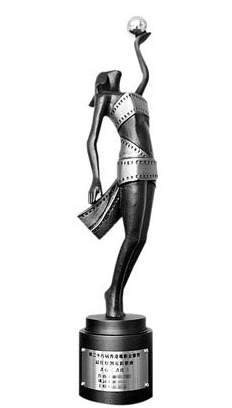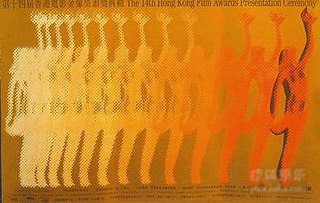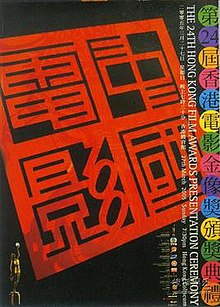
Crouching Tiger, Hidden Dragon is a 2000 wuxia martial arts film directed by Ang Lee and written for the screen by Wang Hui-ling, James Schamus, and Tsai Kuo-jung. The film stars Chow Yun-fat, Michelle Yeoh, Zhang Ziyi, and Chang Chen. It is based on the Chinese novel of the same name, serialized between 1941 and 1942 by Wang Dulu, the fourth part of his Crane-Iron Series. Set in 19th-century Imperial China, the plot follows two master warriors, Li Mu Bai (Chow) and Yu Shu Lien (Yeoh), who are faced with their greatest challenge when the treasured Green Destiny sword is stolen by the mysterious thief Jen Yu (Ziyi).

Fang Shilong, known professionally as Jackie Chan, is a Hong Kong actor, director, writer, producer, martial artist, and stuntman known for his slapstick - acrobatic fighting style, comic timing, and innovative stunts, which he typically performs himself. Before entering the film industry, he was one of the Seven Little Fortunes from the China Drama Academy at the Peking Opera School, where he studied acrobatics, martial arts, and acting. In a film career spanning more than sixty years, he has appeared in over 150 domestic and international movies. Chan is regarded as one of the most iconic and influential martial artists in the history of cinema.

Farewell My Concubine is a 1993 Chinese-Hong Kong epic historical drama film directed by Chen Kaige, starring Leslie Cheung, Gong Li and Zhang Fengyi. Adapted for the screen by Lu Wei, based on the novel by Lilian Lee, the film is set in the politically tumultuous 20th-century China, from the early days of the Republic of China to the aftermath of the Cultural Revolution. It chronicles the troubled relationships amongst two lifelong friends, the Peking opera actors Cheng Dieyi (Cheung) and Duan Xiaolou (Zhang), and Xiaolou's wife Juxian (Gong).

Tony Leung Chiu-wai is a Hong Kong actor and singer. He is one of Asia's most successful and internationally recognized actors. He has won many international acting prizes, including the Cannes Film Festival award for Best Actor for his performance in Wong Kar-wai's film In the Mood for Love. He was named by CNN as one of "Asia's 25 Greatest Actors of All Time".

Sammi Cheng Sau-man is a Hong Kong singer and actress. She is considered one of the most prominent female singers in Hong Kong, with album sales of over 25 million copies throughout the Asia-pacific. Most notably in the 1990s, she was dubbed by the media as the "Cantopop Diva". Having success in entertainment industry for over three decades, Cheng is also best known for her roles in Hong Kong rom-com films in the early 2000s that were box office hits. For her performance in the 2022 film Lost Love, she won 4 best actress honors including the Hong Kong Film Award for Best Actress.

Lin Li-hui, better known by her stage name Shu Qi, is a Hong Kong–Taiwanese actress and model.

The Hong Kong Film Awards, founded in 1982, is an annual film awards ceremony in Hong Kong. The ceremonies typically take place in April, and have mostly been held at the Grand Theatre of the Hong Kong Cultural Centre since 1991. The awards recognise achievement in various aspects of filmmaking, such as directing, screenwriting, acting and cinematography. The awards are regarded as the Hong Kong equivalent of the Academy Awards.

The One-Armed Swordsman is a 1967 Hong Kong wuxia film produced by the Shaw Brothers Studio. Directed by Chang Cheh, it was the first of the new style of wuxia films emphasizing male anti-heroes, violent swordplay and heavy bloodletting. It was the first Hong Kong film to make HK$1 million at the local box office, propelling its star Jimmy Wang to super stardom.

Myolie Wu Hang-yee is a Hong Kong actress and singer. She is previously managed by Hong Kong TVB television station and Neway Star. In 2011, she won Best Actress for her role in Curse of the Royal Harem, Most Favourite TV Female Character for her role in Ghetto Justice and also "Extraordinary Elegant Actress" at the TVB Anniversary Awards 2011, making her the first ever Triple TV Queen of the year.

Ceremony for the 26th Hong Kong Film Awards was held on 15 April 2007 in the Hong Kong Cultural Centre and hosted by Bowie Tsang, Nick Cheung and Lam Chi-chung. Twenty-six winners in nineteen categories were unveiled, with film After This Our Exile being the year's biggest winner. The ceremony also featured performances by Jay Chou, Eason Chan, Alive and Jane Zhang.

The 14th Hong Kong Awards ceremony, honored the best films of 1994 and took place on 23 April 1995 at Hong Kong Academy for Performing Arts, Wan Chai, Hong Kong. The ceremony was hosted by John Sham and Meg Lam, during the ceremony awards are presented in 17 categories.
The Asian Film Awards are presented annually by the Asian Film Awards Academy to recognise the excellence of the film professionals in the film industries of Asian cinema.

The Ceremony for the 27th Hong Kong Film Awards was held on 14 April 2008 in the Hong Kong Cultural Centre and hosted by Carol Cheng, Sandra Ng and Sammi Cheng. Winners in nineteen categories were unveiled, with the film The Warlords being the year's biggest winner.
The Hong Kong Film Award for Best Actress is an award presented annually at the Hong Kong Film Awards (HKFA). It is given to honour an actress who has delivered an outstanding performance in a Hong Kong film.[Note 1] The 1st Hong Kong Film Awards ceremony was held in 1982, with no formal nomination procedure established; the award was given to Kara Wai for her role in My Young Auntie. After the first award ceremony, a nomination system was put in place whereby no more than five nominations are made for each category and each entry is selected through two rounds of voting. Firstly, prospective nominees are marked with a weight of 50% each from HKFA voters and a hundred professional adjudicators, contributing towards a final score with which the top five nominees advance to the second round of voting. The winner is then selected via a scoring process where 55% of the vote comes from 55 professional adjudicators, 25% from representatives of the Hong Kong Performing Artistes Guild and 20% from all other HKFA Executive Committee Members.

Scud is the professional name of Guangzhou, China-born Hong Kong film producer, screenwriter and film director, Danny Cheng Wan-Cheung. He says that he chose the name "Scud" to match his Chinese name, which translates in English as "Scudding Clouds". His films explore somewhat taboo themes within Hong Kong cinema, including same-sex relationships and drug-taking. His film-making style eschews cynicism or gritty realism, and embraces an acceptance of the life choices made by his characters, rather than a search for "solutions". Scud has cited Pier Paolo Pasolini, Yukio Mishima, Pedro Almodovar and Peter Greenaway as directors who have influenced his work.

Ten Years is a 2015 Hong Kong speculative fiction anthology film, featuring a vision of the semi-autonomous territory in the year 2025, with human rights and freedoms gradually diminishing as the Chinese government exerts increasing influence there. Produced on a shoestring budget, the film was a surprise hit, beating Star Wars: The Force Awakens at the Yau Ma Tei cinema where it was first released. It was released on Netflix in February 2019.

Li Li-hua was a Chinese actress, better known as an actress from the Shaw Brothers Studio. In 1957, Li married Hong Kong actor and director Yan Jun (嚴俊).
The Hong Kong Film Award for Best New Director is an annual Hong Kong industry award presented to a director who is considered the best of the year.















